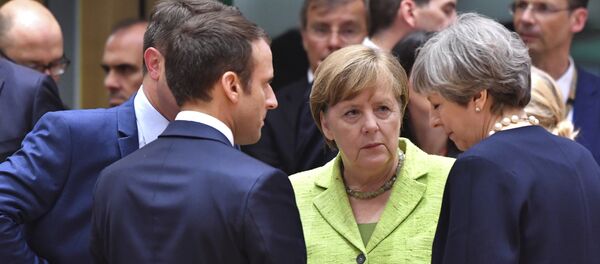According to European Parliament's president, Theresa May said it's possible to achieve an agreement on a transition period, but not with a clear position on the timing.
Radio Sputnik has discussed the proposed extension of the Brexit transition period with Dr. Nikos Skoutaris, an expert in conflict resolution and European Union law at the University of East Anglia.
Sputnik: In your view, how likely is it that the transitional period for Brexit would be extended?
If there is a political will from the UK side, if the UK side actually says that this is what they want to do, I think that the EU has already signaled that they would welcome such a prospect.
READ MORE: British PM May Open to Longer Transition as ‘No-Deal' Brexit Looms
Sputnik: I think that it's obviously in the EU's best interest to try to push for an extension of the transitional period. After all, the European Union fee, the 350 million that the UK is paying will continue to be paid, and, obviously, that's what the EU wants. Ultimately, I would have thought that the EU wants the UK to basically change its mind and withdraw from having a Brexit decision and to remain in the EU; so it's doing everything it can to get the UK to remain. Is that your feeling as well?
Nikos Skoutaris: Not really. One of the things that we have to appreciate and understand is that transition can only happen after Brexit takes place, in the sense that transition will only start if on March 29, 2019 officially and legally speaking the UK is out of the EU. The transition, or the implementation period, or whatever it's going to be called, is a period after this happens.
So, if the UK wants to actually benefit from the single market and the customs union for 2021, then they would have to contribute to the EU budget.
Sputnik: What would the reaction be from the Brexiteers with regard to this news? They're not going to be happy though, are they?
Nikos Skoutaris: No, they aren't. Nigel Farage made clear that this is the sellout. Today we have a number of MPs who are proponents of a harder form of Brexit and they have already declared that what the PM is doing is not in agreement with what they want to see. Indeed, the people that are proposing a harder form of Brexit, what we tend to call the Brexiteers aren't happy with such a prospect.
READ MORE: EU Parliament Might Vote Against Brexit Deal If Irish Border Issue Not Settled
Sputnik: What impact can this have on Theresa May's position as prime minister? Some experts are now saying that her position is actually strengthening and it looks as though she would actually hold premiership probably until the next general election where some have actually foreseen that the Brexit situation will still be basically the key event that's not being finalized or concluded; and that the next general election will actually act like the next referendum. Have you got a take on that?
Sputnik: What's your general feeling about the prime minister then in terms of what she is going gain to win by offering an extension? Is it purely advantageous for her own position or is it advantageous for the country in trying to navigate the negotiation of this highly complex event that historically is never going to come around again? It's absolutely key that this particular event is concluded absolutely correctly and to the benefit of the whole country and it's a very nerve-racking event to oversee and manage; is she winning anything by this herself, or is it based on the country's interest or on her own interest?
Nikos Skoutaris: The main thing that the PM gains by extending the transition period is time; time to find the proper future relationship between the EU and the UK. To show you how much time she would need, the EU-Canada deal was negotiated over a period of almost seven years. To believe that the EU-UK trade relationship is going to be sorted out within a year and a half, 20 months, as the initial transition period was would have been extremely difficult.
READ MORE: Media Speculates EU, UK Negotiators Reach Brexit Divorce Deal
Getting another year gives more time to the EU and the UK to actually pin down the proper political and legal arrangement for the future. At the same time, it gives time to the UK in order to avoid what they think would be a very bad scenario which is the backstop proposal for Northern Ireland which would mean that Northern Ireland remains within the EU customs union.
The main benefit for extending the transition period is gaining a bit more time, getting some breathing space in order for the negotiators after March 29, 2019 to manage to actually sort out the future relations between the EU and the UK.
Views and opinions expressed in the article are those of Nikos Skoutaris and do not necessarily reflect those of Sputnik.






